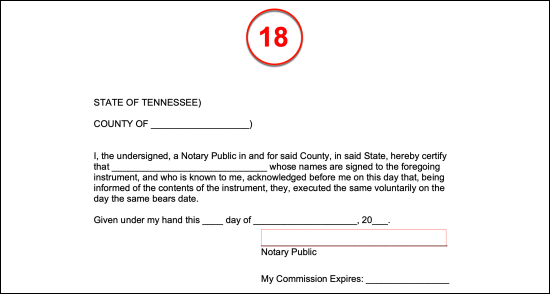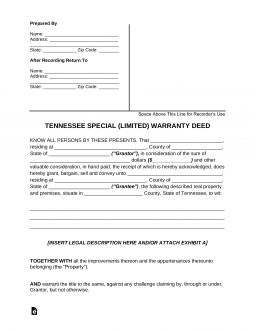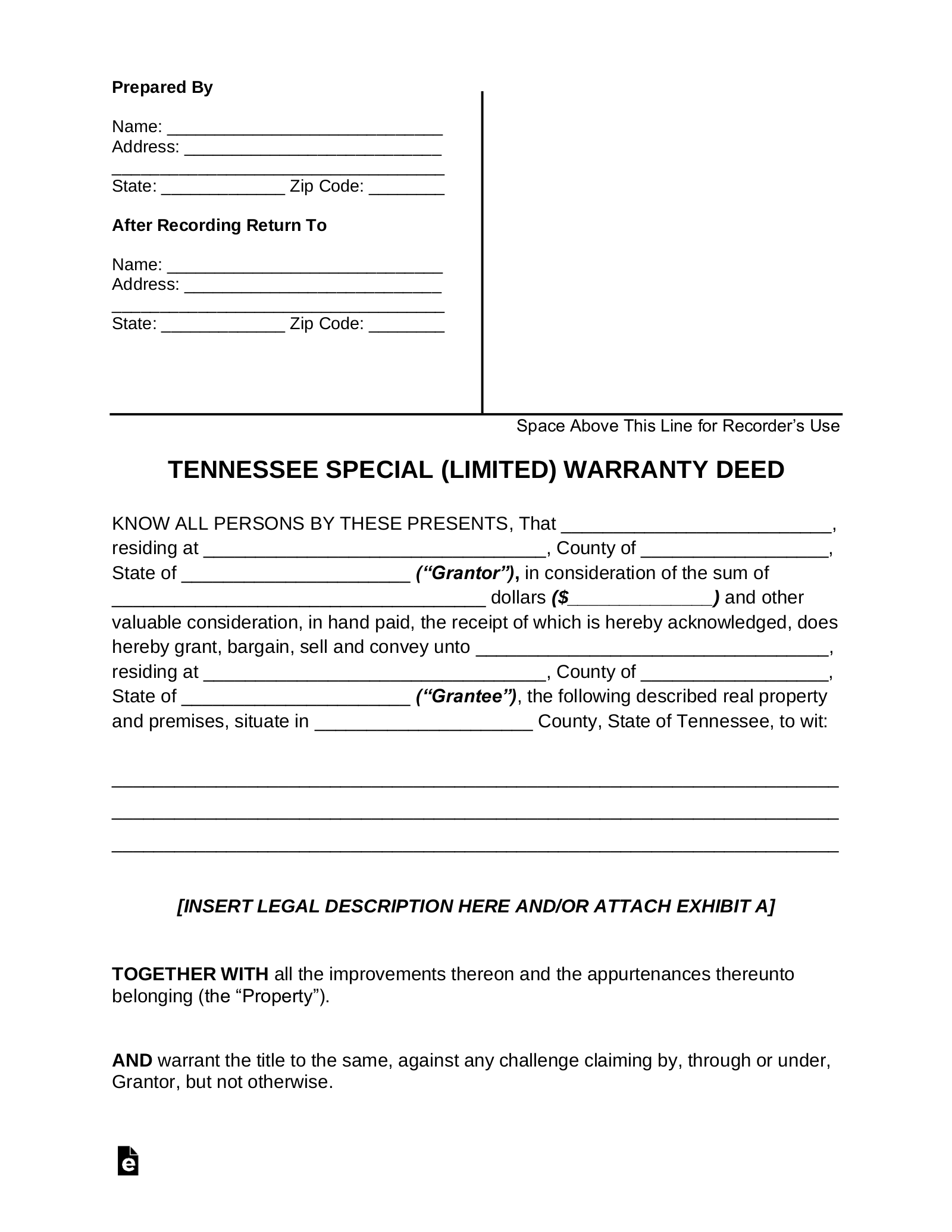Updated April 12, 2024
A Tennessee special warranty deed guarantees to the new owner (grantee) against claims on the property during the grantor’s ownership period. The grantee will be liable for any claims prior to the grantor’s ownership which can be resolved through a title search.
Laws – Title 66 (Property), Chapters 5 & 22
Recording – Register’s Office in the county where the property is located.[1]
Signing – Must be signed with the Grantor(s) in the presence of a Notary Public or two (2) subscribing witnesses.[2]
How To Write
Download: PDF, MS Word, OpenDocument
I. Tennessee Deed Preparer
(1) Preparer Of Tennessee Statement. The conveyance statement that will approve a transfer of Tennessee property ownership will require a significant amount of physical preparation. Therefore, a Preparer will need to satisfy the reports required by this document so that it may be signed by the Grantor. The name of this Preparer is expected on the first line of the “Prepared By” section.
(2) Business Address. Continue through the first section (of the header) with a record of the entire business address of the concerned Preparer. Place each address item where it is required.

II. Grantor Authorized Recipient
(3) Tennessee Deed Recipient. This document will be signed into effect by the Tennessee Property Seller. He or she will therefore need to authorize a specific Party that may act as a Recipient to the physical original once the Tennessee County Registrar’s Office has filed it. Dispense the name of this recording’s Authorized Recipient so that the Registrar’s Office may direct this return properly.
(4) Formal Mailing Address. Supply the Tennessee County Registrar’s Office with the mailing address needed to direct the registered transfer statement to the formally named Recipient above.

III. Tennessee Grantor
(5) Tennessee Property Seller. The Party with the right to sell the real property and is releasing it with this deed will be the first report that must be completed in the statement made. The first line in the statement made requires the production of the name of every Tennessee Grantor authorizing the release of his or her Tennessee real estate by signing this statement.

(6) Residential Street Address. Every Tennessee Grantor (identified as such above) must also be identified through his or her home address. Begin with the first address line of the geographical location of the Tennessee Grantor’s home address by recording the building number, the name or number of the street, and the unit number where each Grantor lives. An attachment may be used to produce a full roster of every Tennessee Grantor and his or her home address if needed.
(7) County And State Of Tennessee Grantor Residence. Complete the Tennessee Grantor’s home address with the County and State where he or she lives.

IV. Payment Of Tennessee Property
(8) Written Payment Report. The money that was paid to the Tennessee Grantor(s) so that the concerned real estate can be released requires definition. Write out the price of the Tennessee real property. It is strongly recommended that the Grantor receives payment for the full price of the property before signing this document.
(9) Numerical Confirmation. Reproduce the reported amount of money paid to the Tennessee Grantor(s) by displaying it numerically on the space found inside the parentheses.

V. Tennessee Grantee
(10) Tennessee Property Grantee. Typically the Purchaser of the Tennessee property will be the same Party who will take over the property. However, this is not a requirement of the Grantee. The Grantee in this document will be the Party with the right to receive the Grantor’s ownership over the Tennessee property and will require identification in the transfer statement.
(11) Home Street Address. The Tennessee Grantee(s) this instrument designates with the legal right to acquire the Grantor’s real estate must have their identity confirmed with a record of the home street address of each of these Grantees. The building number, the street or road, as well as any unit number needed to access the Tennessee Grantees residence must make up the next report needed by this statement. Make sure this information accompanies the name of each Tennessee Grantee.
(12) County And State Of Tennessee Grantee Residence.

VI. Tennessee Property Description
(13) County Of Tennessee Real Property. Identify, the Tennessee County where one can (physically) visit the real property.
(14) Legal Description On File. The last time the property’s deed was filed with the County Registrar will be the most recent legal description of the property (in most cases). This document will require the legal description of the Tennessee property included in its content. If the last deed that was filed for this property is available, this may be used as a source for the required legal description as well.
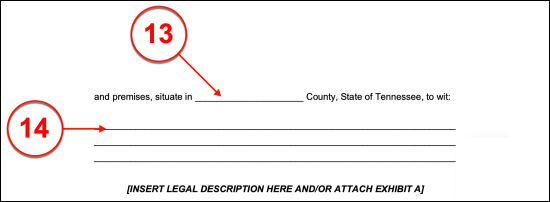
VII. Signature Of Tennessee Grantor
(15) Authorizing Signature Of Grantor. The Tennessee Grantor’s signature is a strict requirement of this deed. It must be produced before two adult Witnesses, or if preferred, a licensed Notary Public. Once the Tennessee Grantor has gathered with either of these Parties, he or she will need to seek out the signature line then sign his or her name.

(16) Tennessee Grantor Name And Address. A record of the Tennessee Grantor’s name and address must be submitted as confirmation of his or her identity after the Tennessee Grantor has signed this document.

VIII. Tennessee Grantor Signature Authentication
(17) Witness To Tennessee Statement Execution. If the Tennessee Grantor has signed this document before two adult Witnesses, then he or she must relinquish control of the signed to document to the observing Witnesses. Each Witness must sign his or her name, print his or her name, and print his or her address to show that the identity of the Tennessee Grantor has been verified to the best of their abilities.
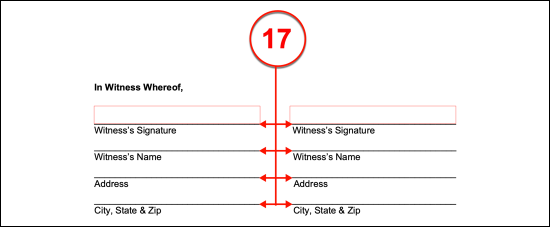
(18) Notarization As Verification. If the Tennessee Grantor elected to sign this document under the observance of a qualified Notary, then the Notary Public will take control of this document to display the notarization process has been successfully engaged then completed.
